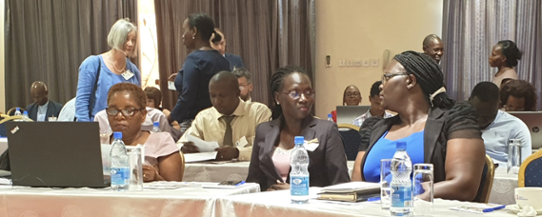Specialists from different institutions in Sweden join efforts in knowledge, information and networking to provide participants with optimal and specialized support. Workshops and webinars are organised in countries in order to sustain knowledge sharing and ensure the progress of projects.
Africa’s future is urban with more than half of its population projected to be living in cities by 2050. This means about 60% of urban areas still need to be erected in the near future – in the best way possible. In addition, many evolving future megacities are in located in areas highly vulnerable to climate change effects. In the meantime, communities in rural areas face increasing challenges to to meet growing food production demands while adapting their livelihoods to a changing climate.
The programme aims to tackle challenges posed by climate change, sustainable urbanisation, growing emissions and explore viable adaptation potentials.
Tailored for institutional process enhancement
The cornerstone of the programme is to coach local institutions for good implementation of their National Determined Contribution process, and the New Urban Agenda by supporting an inclusive planning of sustainable urbanisation with a climate and ecosystem service perspective. To meet these challenges the programme is focusing on:
- Supporting enhanced data production and analysis,
- Contributing to enhanced transparency regarding data and processes,
- Providing support for improved coordination and cooperation among actors.
Participants' profiles
The participants belong mostly to those administrations with a mandate of producing climate resilience data, and promoting measures for climate change mitigation and adaptation in diverse sectors including the environment, agriculture, water management, urban planning, statistics, transport, energy, etc.

Starting in Ethiopia, Kenya, Mozambique, Uganda and Zimbabwe, the programme aims to spread to other countries/regions and strive towards long term cooperation between the partner countries and Swedish authorities.
Each of the selected participants have brought a Project for Change, endorsed by their organisations. The Projects for Change involve several administrations. All participants developed and implemented their Project for Change consistent with the goals of the programme. The projects were supported during the programme through coaching and experience sharing.
Programme of activities
The programme is based on peer to peer learning – both South-South and North-South. It is desgined to be flexible and adaptive in its nature and adjusted according to needs in partner countries. Programme activities include:
- On site: a series of regional workshops with group discussions, lectures on cross-cutting themes relevant to the countries and the projects, and project coaching.
- Remotely: coaching of projects by distance in between workshops. A series of webinars open to all the participants.
- Swedish participation in international and national workshops, training of trainers etc.
Coaching philosophy
The coaching philosophy relies on two parallel tracks:
- Provide assistance for project management from project design, to project monitoring.
- Provide skilled assistance by mobilizing capabilities within the participating Swedish authorities for specific questions.
Global goals
The organisation of the programme was designed to fit the 2030 Agenda for Sustainable Development and mostly the goals:
- 11 – Make cities and human settlements inclusive, safe, resilient and sustainable
- 13 – Take urgent action to combat climate change and its impacts
- 16 – Promote peaceful and inclusive societies, provide access to justice for all and build effective, accountable and inclusive institutions at all levels
Swedish implementing partners
The implementing partners were the Swedish Environmental Protection Agency, Swedish Meteorological and Hydrological Institute, Statistics Sweden, Swedish University of Agricultural Sciences, Swedish Energy Agency, and the National Board of Housing, Building and Planning.
